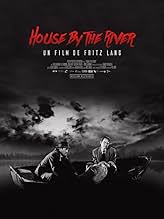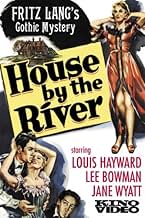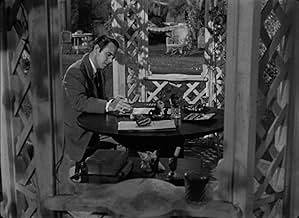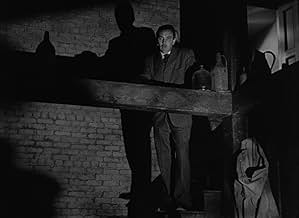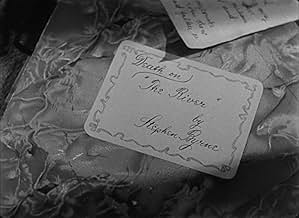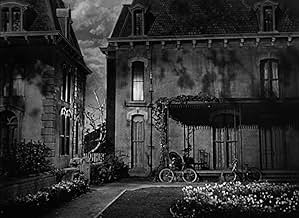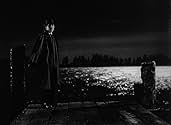CALIFICACIÓN DE IMDb
7.0/10
4.6 k
TU CALIFICACIÓN
Agrega una trama en tu idiomaA deranged writer murders a maid after she resists his advances. The writer engages his brother's help in hiding the body, causing unexpected problems for both of them.A deranged writer murders a maid after she resists his advances. The writer engages his brother's help in hiding the body, causing unexpected problems for both of them.A deranged writer murders a maid after she resists his advances. The writer engages his brother's help in hiding the body, causing unexpected problems for both of them.
- Dirección
- Guionistas
- Elenco
Bob Burns
- Courtroom Spectator
- (sin créditos)
Edgar Caldwell
- Square Dancer
- (sin créditos)
Edward Clark
- Minor Role
- (sin créditos)
Frank Dae
- Col. Davis
- (sin créditos)
- Dirección
- Guionistas
- Todo el elenco y el equipo
- Producción, taquilla y más en IMDbPro
Opiniones destacadas
Intense period thriller about a writer, Stephen Byrne (played by Louis Hayward), who lives in - yeah, you guessed it - a house by the river; with lovely yard and gazebo, yet oddly dark as the film opens with the sky clouded, shadows cast across scenery, haunting music, a dead animal floating by on the glistening water, and a black widow spider crawling over his writing. We meet the attractive, blonde servant girl, Emily, who Stephen clearly has a lustful eye on from the get-go. By the next scene, he tries to kiss her coming down the stairs after bathing in his tub, and, well, she screams and he "accidentally" strangles her. With his brother assisting him, they put her body in a big sack and sink her in the river, then follows the cover-up of the murder.
Well, this film is quite interesting, dark and suspenseful - there's a lot going on here. The print I saw looked strikingly full of sharp black and white contrast. The photography in this makes the film menacing with blackened rooms lit only by candle light casting dark, sharp shadows across the walls, some extreme camera angles up stairs and down halls, shots of faces seen only in mirrors, extreme close-ups, and sweat dripping on the face of a nervous murderer.
Well, this film is quite interesting, dark and suspenseful - there's a lot going on here. The print I saw looked strikingly full of sharp black and white contrast. The photography in this makes the film menacing with blackened rooms lit only by candle light casting dark, sharp shadows across the walls, some extreme camera angles up stairs and down halls, shots of faces seen only in mirrors, extreme close-ups, and sweat dripping on the face of a nervous murderer.
For some reason, the great director chose to degrade this film on some occasions, yet at other times he would revel in details of the film's opening quarter-hour. However, at the time that he made this film, he was despondent over the collapse of his Diana Productions which was a co-venture with Joan Bennett and her husband Walter Wanger. With no offers in sight from the majors, Lang chose to visit "Poverty Row" which may have left him with bad memories of a film of which he should have been more pleased.
In HOUSE BY THE RIVER, we have Lang working at the bargain basement Republic Pictures, where Orson Welles had just made a similar descent to make MACBETH. In each case, the decline was only in budget, not in quality. In Lang's case, we have a film that plays as a great companion piece to his SECRET BEHIND THE DOOR, both being a change of pace Gothic thriller from the master of spies and noir.
Incidentally, the promise of artistic freedom offered at Republic did stop when Lang attempted to cast a black actress as the maid. We're just lucky that Vera Hruba Ralston (wife of company head Yates) wasn't cast as the wife.
The screenwriter, Mel Dinelli, working from the A.P. Herbert novel, was a past and future hand at these "house" mellers - he previously did the screenplay for THE SPIRAL STAIRCASE and would do BEWARE, MY LOVELY in 1952. He segued well from Robert Siodmak to Fritz Lang as long-time Langian themes such as conscience and fate are in evidence here. Oddly, it is not the lead who suffers a conscience. Hayward's Stephen Byrne, a hack writer who has been lusting for the new maid played by Dorothy Patrick, revels in his self-promoted celebrity now that she's "disappeared." She's actually been accidentally murdered by Stephen, who had been filled with lustful thoughts as the maid bathed and seems to have a near orgasm as he hears the bathwater go down the drain outside the house - the look on Hayward's face is priceless.
It's his brother John who aided him in hiding the body (and who is referred to as having gotten his brother out of other scrapes) who turns to drink to quell his conscience and who is the primary suspect in the inquest. Little does he know that his brother is subtly implicating him in the crime in toto. His fate would be that no good deed (siblingly speaking) goes unpunished. The brother is played by Lee Bowman, and it's the only role of his in which I can say he's memorable. That's not to say that otherwise he's a forgettable player, just that he's not distinguishable from a bunch of mustachioed players who came out while the head ranks were off to war and who quickly had to retreat once they returned.
Hayward is so enjoying his celebrity that he's signing books by day and wife Jane Wyatt refers to him being out all night and smelling of cheap perfume when he comes home. She's beginning to realize that Lee Bowman's John Byrne is the better of the brothers, although the story implies that she was his own unrequited love.
But as unsympathetic as Stephen Byrne may be, before an audience ever rooted for Robert Walker trying to retrieve his lighter in STRANGERS ON A TRAIN, we share Stephen's fears of the body doing some synchronized swimming with the deer. While attempting to retrieve it, he only makes it worse for himself by accidentally (he can't do much right it seems) opening the top of the sack and letting out some flowing blond hair to make it even more obvious. When Stephen later finds that his brother's monogram is on the sack, he breaks into a devilish smile of contentment.
Cinematographer Edward Cronjager works well with Lang on their second pairing (the previous one was the gorgeous Technicolor WESTERN UNION). When the body (in a sack) starts popping up in the river, we recall the image of a floating deceased deer from earlier in the film and a character's claim that it shows up at about the same time every day given the tide.
If the ending seems rushed, it's only a reflection of the lead character's madness (a quick snap), unlike the state of mind of Chris Cross (Edward G. Robinson) at the ending of SCARLET STREET which is more detailed. It could have been a bit tidier, but maybe the head man cut the budget and schedule short. It was known to happen at Republic.
In HOUSE BY THE RIVER, we have Lang working at the bargain basement Republic Pictures, where Orson Welles had just made a similar descent to make MACBETH. In each case, the decline was only in budget, not in quality. In Lang's case, we have a film that plays as a great companion piece to his SECRET BEHIND THE DOOR, both being a change of pace Gothic thriller from the master of spies and noir.
Incidentally, the promise of artistic freedom offered at Republic did stop when Lang attempted to cast a black actress as the maid. We're just lucky that Vera Hruba Ralston (wife of company head Yates) wasn't cast as the wife.
The screenwriter, Mel Dinelli, working from the A.P. Herbert novel, was a past and future hand at these "house" mellers - he previously did the screenplay for THE SPIRAL STAIRCASE and would do BEWARE, MY LOVELY in 1952. He segued well from Robert Siodmak to Fritz Lang as long-time Langian themes such as conscience and fate are in evidence here. Oddly, it is not the lead who suffers a conscience. Hayward's Stephen Byrne, a hack writer who has been lusting for the new maid played by Dorothy Patrick, revels in his self-promoted celebrity now that she's "disappeared." She's actually been accidentally murdered by Stephen, who had been filled with lustful thoughts as the maid bathed and seems to have a near orgasm as he hears the bathwater go down the drain outside the house - the look on Hayward's face is priceless.
It's his brother John who aided him in hiding the body (and who is referred to as having gotten his brother out of other scrapes) who turns to drink to quell his conscience and who is the primary suspect in the inquest. Little does he know that his brother is subtly implicating him in the crime in toto. His fate would be that no good deed (siblingly speaking) goes unpunished. The brother is played by Lee Bowman, and it's the only role of his in which I can say he's memorable. That's not to say that otherwise he's a forgettable player, just that he's not distinguishable from a bunch of mustachioed players who came out while the head ranks were off to war and who quickly had to retreat once they returned.
Hayward is so enjoying his celebrity that he's signing books by day and wife Jane Wyatt refers to him being out all night and smelling of cheap perfume when he comes home. She's beginning to realize that Lee Bowman's John Byrne is the better of the brothers, although the story implies that she was his own unrequited love.
But as unsympathetic as Stephen Byrne may be, before an audience ever rooted for Robert Walker trying to retrieve his lighter in STRANGERS ON A TRAIN, we share Stephen's fears of the body doing some synchronized swimming with the deer. While attempting to retrieve it, he only makes it worse for himself by accidentally (he can't do much right it seems) opening the top of the sack and letting out some flowing blond hair to make it even more obvious. When Stephen later finds that his brother's monogram is on the sack, he breaks into a devilish smile of contentment.
Cinematographer Edward Cronjager works well with Lang on their second pairing (the previous one was the gorgeous Technicolor WESTERN UNION). When the body (in a sack) starts popping up in the river, we recall the image of a floating deceased deer from earlier in the film and a character's claim that it shows up at about the same time every day given the tide.
If the ending seems rushed, it's only a reflection of the lead character's madness (a quick snap), unlike the state of mind of Chris Cross (Edward G. Robinson) at the ending of SCARLET STREET which is more detailed. It could have been a bit tidier, but maybe the head man cut the budget and schedule short. It was known to happen at Republic.
House by the River is something of an anomaly; it's more of an old-dark-house Gothic than the grittier dramas, from Fury to Beyond A Reasonable Doubt, which Fritz Lang made in his American period. (The location of this house is a worrisome and amateurism anomaly, too; the conventions, milieu and some of the accents suggests that it's an English country estate, but much else argues that the film takes place in the U.S.) Would-be writer Louis Hayward, getting flirtatious with the maid in the absence of his wife (Jane Wyatt), accidently strangles her when she resists his advances. His brother (Lee Bowman) reluctantly agrees to cover up for him and help sink the body in the sinister, ever-present river that runs by the edge of the property; the resulting scandal of the disappeared servant bolsters the writer's flagging career. When suspicion begans to gather around his innocent brother, Hayward, by now seriously demented, couldn't be more pleased. But then Wyatt comes across a hidden manuscript; Hayward (you see), flushed by his phoney success, resolves to write "what he knows...."
Edward Cronjager's heavily shaded cinematography and Georges Anthiel's brooding score help fill out Lang's dark, clammy vision, making the river -- forever disgorging its flotsam and jetsam -- a principal character in the action. House by the River is a good old-fashioned thriller, particularly in its Gothic closing scenes, but it's not in a class with Lang's films at the top of his American form, like Scarlet Street, The Big Heat or Human Desire.
Edward Cronjager's heavily shaded cinematography and Georges Anthiel's brooding score help fill out Lang's dark, clammy vision, making the river -- forever disgorging its flotsam and jetsam -- a principal character in the action. House by the River is a good old-fashioned thriller, particularly in its Gothic closing scenes, but it's not in a class with Lang's films at the top of his American form, like Scarlet Street, The Big Heat or Human Desire.
House by the River is directed by Fritz Lang and adapted by Mel Dinelli from A.P. Herbert's novel The House on the River. It stars Louis Hayward, Jane Wyatt, Lee Bowman & Dorothy Patrick. Music is by George Antheil and photography by Edward J. Cronjager.
Novelist Stephen Byrne (Hayward) makes a play for the house maid and unwittingly kills her when she repels his advances. Enlisting the help of his disabled brother, John (Bowman), to dispose of the body in the river, Stephen suddenly finds that the publicity surrounding the maid's disappearance has put him in vogue again. In fact he finds his muse sufficiently stoked enough to craft another novel. But as easy as Stephen finds it easy to have no conscience, the opposite is the case with John, and with the river refusing to hold its secrets, something is going to give.
Working out of Republic pictures, Lang refused to let the low budget production hamper his vision of a bleak Cain & Abel like Gothic-noir-melodrama. He did, however, meet some resistance when requesting that the maid be played by a black woman, which was quickly shot down by nervous executives at the famed "B" movie studio. House by the River is far from being among the best of Lang's work, but the final product is still a triumph considering it's basically a three character piece set virtually in just two locations. It scores high on eerie atmosphere and finds Lang dealing in moral bankruptcy/responsibility and the eye for an eye mentality. Ushered into the narrative, too, is a Lang fave of people irked by loving someone they can't have. These themes allow the director to gloss over the simple script and dally in some truly arresting visuals.
Aided considerably by Cronjager's (Desert Fury/CanyonPassage) chiaroscuro photography, Lang's film is a lesson in how to maximise effect from limited sets. The actual house on the river, and that of the neighbour (resplendent with creepy scarecrow in garden), has a very disquiet feel to it, fronted by shimmering water that carries the dead carcass' of animals, it's a most haunting setting. And the eerie atmosphere continues inside the house, where shadows work their wonders and Antheil's music sticks rigidly (and rightly) to the creaky house formula. The cast don't pull up any trees, but they don't need to. Hayward is perhaps too animated for a study in snide villainy, but it works and he has a nice line in visual mocking. The rest fall in line for what is required, with the best of the bunch being Ann Shoemaker as nosey neighbour Mrs. Ambrose.
Once a hard to find film, House by the River is now easily accessible after gaining a DVD release (the print is fine, some age spotting and crackles, but completely watchable). It's a film that is easily recommended to Lang and Gothic house based movie purists. Driven by a despicable protagonist and cloaked in a creepy noirish vibe, it deserves to now gain a better and more appreciative audience. 7.5/10
Novelist Stephen Byrne (Hayward) makes a play for the house maid and unwittingly kills her when she repels his advances. Enlisting the help of his disabled brother, John (Bowman), to dispose of the body in the river, Stephen suddenly finds that the publicity surrounding the maid's disappearance has put him in vogue again. In fact he finds his muse sufficiently stoked enough to craft another novel. But as easy as Stephen finds it easy to have no conscience, the opposite is the case with John, and with the river refusing to hold its secrets, something is going to give.
Working out of Republic pictures, Lang refused to let the low budget production hamper his vision of a bleak Cain & Abel like Gothic-noir-melodrama. He did, however, meet some resistance when requesting that the maid be played by a black woman, which was quickly shot down by nervous executives at the famed "B" movie studio. House by the River is far from being among the best of Lang's work, but the final product is still a triumph considering it's basically a three character piece set virtually in just two locations. It scores high on eerie atmosphere and finds Lang dealing in moral bankruptcy/responsibility and the eye for an eye mentality. Ushered into the narrative, too, is a Lang fave of people irked by loving someone they can't have. These themes allow the director to gloss over the simple script and dally in some truly arresting visuals.
Aided considerably by Cronjager's (Desert Fury/CanyonPassage) chiaroscuro photography, Lang's film is a lesson in how to maximise effect from limited sets. The actual house on the river, and that of the neighbour (resplendent with creepy scarecrow in garden), has a very disquiet feel to it, fronted by shimmering water that carries the dead carcass' of animals, it's a most haunting setting. And the eerie atmosphere continues inside the house, where shadows work their wonders and Antheil's music sticks rigidly (and rightly) to the creaky house formula. The cast don't pull up any trees, but they don't need to. Hayward is perhaps too animated for a study in snide villainy, but it works and he has a nice line in visual mocking. The rest fall in line for what is required, with the best of the bunch being Ann Shoemaker as nosey neighbour Mrs. Ambrose.
Once a hard to find film, House by the River is now easily accessible after gaining a DVD release (the print is fine, some age spotting and crackles, but completely watchable). It's a film that is easily recommended to Lang and Gothic house based movie purists. Driven by a despicable protagonist and cloaked in a creepy noirish vibe, it deserves to now gain a better and more appreciative audience. 7.5/10
Louis Hayward utters this chilling line. His brother, Lee Bowman, has a physical disability. He has always been loyal to Hayward. But Hayward is looking out for number one -- big time.
I had seen a terrible print of this movie once years ago and figured it to be lesser Fritz Lang. Not so! It is certainly one of the very best of his American movies. It's beautifully filmed, extremely well plotted, and cast superbly.
It is, in summary, a terrifying movie.
The Hayward character is responsible for a killing very early in the plot. He had not intended it, though his motives were not very high in the circumstance causing it. He doesn't care whom he drags down to keep his name clear and finish the book he is writing about the crime.
In addition to excellent performances by Hayward, Bowman, and Jane Wyatt as Hayward's wife, the supporting cast is a dream: Plump Jody Gilbert is pathetic and hateful simultaneously as Bowman's maid. Ann Shoemaker gives a touch of comic relief -- but just a touch -- as a nosy neighbor of Hayward and Wyatt.
Like the best of Lang -- "The Big Heat," "Fury," "M," "Metropolis," and the Mabuse films -- this concerns morality and its lack. There is a Biblical feel to it, as evidenced in the quote from Hayward (Cain) regarding his fine brother Abel/Bowman.
It could scarcely be better than it is.
I had seen a terrible print of this movie once years ago and figured it to be lesser Fritz Lang. Not so! It is certainly one of the very best of his American movies. It's beautifully filmed, extremely well plotted, and cast superbly.
It is, in summary, a terrifying movie.
The Hayward character is responsible for a killing very early in the plot. He had not intended it, though his motives were not very high in the circumstance causing it. He doesn't care whom he drags down to keep his name clear and finish the book he is writing about the crime.
In addition to excellent performances by Hayward, Bowman, and Jane Wyatt as Hayward's wife, the supporting cast is a dream: Plump Jody Gilbert is pathetic and hateful simultaneously as Bowman's maid. Ann Shoemaker gives a touch of comic relief -- but just a touch -- as a nosy neighbor of Hayward and Wyatt.
Like the best of Lang -- "The Big Heat," "Fury," "M," "Metropolis," and the Mabuse films -- this concerns morality and its lack. There is a Biblical feel to it, as evidenced in the quote from Hayward (Cain) regarding his fine brother Abel/Bowman.
It could scarcely be better than it is.
¿Sabías que…?
- TriviaFritz Lang originally wanted a black woman to play the role of Emily Gaunt, but the producers refused.
- ErroresThe women are dressed in turn of the century type clothing but the men are wearing modern hats and suits.
- Citas
John Byrne: You must be very, very ill Stephen...
Stephen Byrne: Ill?
- Bandas sonorasTurkey in the Straw
(uncredited)
American folk song
Author unknown
Selecciones populares
Inicia sesión para calificar y agrega a la lista de videos para obtener recomendaciones personalizadas
- How long is House by the River?Con tecnología de Alexa
Detalles
- Fecha de lanzamiento
- País de origen
- Idioma
- También se conoce como
- La casa junto al río
- Locaciones de filmación
- Productora
- Ver más créditos de la compañía en IMDbPro
- Tiempo de ejecución1 hora 23 minutos
- Color
- Relación de aspecto
- 1.33 : 1
Contribuir a esta página
Sugiere una edición o agrega el contenido que falta


